The Bible is filled with many "Veterans of War". From the beginning of time war has been a part of mankind's agenda in obliterating evil from this planet... with the majority of the battles being victorious where Israel is concerned. War is defined as "a conflict carried on by force of arms between nations and a period of armed hostility." To hear the variety of responses coming from various churches, mosques and synagogues, one would think that the Scriptures were either silent or irrevocably confused about the purpose of these holy wars. Perhaps the reason for this confusion comes from an attempt to distort a very difficult issue? Or perhaps one just does not comprehend the reason for such brutal events throughout mankind's history? Was mankind meant to understand? Or is mankind destined to continue consecrated combats in the name of the universal Creator? Who knows? And, Who's ? Right ...
A Biblical Definition of War:
The Israelites had to take possession of the Promised Land by conquest. They had to engage in a long and bloody war before the Canaanite tribes were finally defeated and subdued. Except in the case of Jericho and Ai, war did not become overly aggressive till after the death of Joshua. However, God employed the Israelites to sweep the Canaanites from the face of the earth to do away with the evil they inflicted. In the days of King Saul and King David the people of Israel engaged in many conflicts with the ancient nations that surrounded them [ie: Egypt, Assyria, Babylon]. From the first Israelite battle in the BC era to our present time, there have been few periods of peace for Israel and the Jews.
The life of the Christian is also described as 'warfare' and the Christian graces are represented as figurative pieces of armour [Eph. 6:11-17; Thess. 5:8; II Tim. 2:3, 4]. The Crusades were a series of religious expeditionary wars against Muslims blessed by Pope Urban II and the Catholic Church, with the stated goal of restoring Christian access to the holy places in and near Jerusalem. Even though Muslims and Jews fought together to hold back the first of many Christian takeovers, they were unsuccessful in keeping their land.
In Islam, major battles arose between the Meccans and the Muslims. The
Battle of Badr in 624 AD was one of the most important and well-known victory for the Muslims. It is recorded in the Qu'ran that Allah sent an "unseen army of angels" that helped the Muslims defeat the Meccans. This Muslim triumph over
polytheists showed “demonstration of divine guidance and intervention on behalf of Muslims, even when outnumbered".
Biblical Heroes of War:
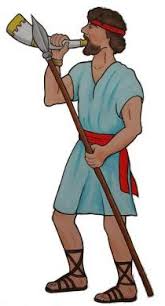 Joshua
Joshua... is a figure in the
Torah, being one of the spies for Israel (Num. 13–14) and in few passages as Moses' assistant. He is the central character in the Hebrew Bible's
Book of Joshua. According to the books
Exodus,
Numbers and
Joshua, he became the leader of the Israelite tribes after the death of Moses. He led the Israelite tribes in the conquest of Canaan, and allocated the land to the tribes afterwards. At the Jordan River, the waters parted, as they had for Moses at the Red Sea. The first battle after the crossing of the Jordan was the
Battle of Jericho. Joshua led the destruction of
Jericho, then moved on to
Ai, a small neighboring city to the west. However, they were defeated with thirty-six Israelite deaths. The defeat was attributed to
Achan taking an "accursed thing" from Jericho; and was followed by Achan and his family and animals being stoned to death to restore God's favor. Joshua then went to defeat Ai. The Israelites faced an alliance of
Amorite kings from
Jerusalem,
Hebron,
Jarmuth,
Lachish, and
Eglon. At
Gibeon Joshua asked God to cause the sun and moon to stand still, so that he could finish the battle in daylight. This event is most notable because "
there was no day like that before it or after it, that the LORD hearkened unto the voice of a man: for the LORD fought for Israel." (Joshua 10:14) God also fought for the Israelites in this battle, for he hurled huge hailstones from the sky which killed more Canaanites than those which the Israelites slaughtered. From there on, Joshua was able to lead the Israelites to several victories, securing much of the land of Canaan.
"Be strong and of good courage; do not be afraid, nor be dismayed, for the Lord your God is with you wherever you go." (Joshua 1:9)
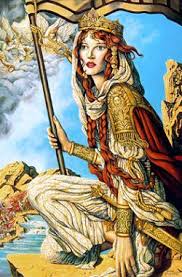 Deborah
Deborah...was a
prophetess of the God of the Israelites, the fourth
Judge of pre-monarchic Israel, counselor, warrior, and the wife of
Lapidoth according to the
Book of Judges chapters 4 and 5. She was the only female judge mentioned in the Bible. Deborah led a successful counterattack against the forces of
Jabin, king of Canaan, and his military commander
Sisera. After being oppressed by Jabin in
Hazor, for twenty years, Deborah prevailed upon
Barak who was the head captain of the army at that time, to face the Assyrian General Sisera, the commander of Jabin's army, in battle. The victory to which the Bible refers is the victory of an Israelite force of ten thousand over Sisera's force of nine hundred iron chariots. (Judges 4:10) When Deborah saw the army, she said, according to Judges 4:14: "
Up; for this is the day in which the LORD hath delivered Sisera into thine hand: is not the LORD gone out before thee? So Barak went down from Mount Tabor, and ten thousand men after him." As Deborah prophesied, the Lord gave the victory to the Israelites. Sisera fled the battle site seeking refuge in the tent of the woman Jael, who killed the enemy leader, Sisera. The biblical account of Deborah ends in Judges 5 and there was peace in the land for 40 years after the battle.
"On that day God subdued Jabin king of Canaan before the Israelites. And the hand of the Israelites pressed harder and harder against Jabin king of Canaan until they destroyed him." (Judges 4:23-24)
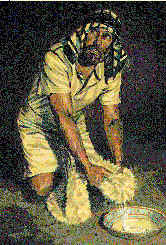 Gideon
Gideon... which means "Mighty warrior" was a judge of the Hebrews and his story is recorded in chapters 6 to 8 in the Book of Judges in the Hebrew bible. He was reluctant of God's command to destroy his enemies, but did follow through and on God's instruction, Gideon destroyed the town's altar to the foreign god
Baal and the symbol of the goddess
Asherah beside it. He went on to send out messengers to gather together men from the tribes of
Asher,
Zebulun, and
Naphtali, as well as his own tribe
Manasseh in order to meet an armed force of the people of Midian and the Amalek that had crossed the Jordan River and were encamped in the
Valley of Jezreel. However, God informed Gideon that the men he had gathered were too many – with so many men, there would be reason for the Israelites to claim the victory as their own instead of acknowledging that God had saved them. God first instructed Gideon to send home those men who were afraid. Gideon then allowed any man who wanted to leave, to leave; 22,000 men returned home and 10,000 remained. Yet the number was still too many, according to God. Finally with 300 men, Gideon claimed the victory over the
Midianites "The Lord said to Gideon, "
With the 300 men that lapped I will save you and give the into your hands. Let all the other men go, each to his own place." (Judges 7:7) Even though Gideon required signs from God before he did His will, he was a great hero of war. Now the Ephraimites asked Gideon,
“Why have you treated us like this? Why didn’t you call us when you went to fight Midian?” And they challenged him vigorously.
But he answered them, “What have I accomplished compared to you? Aren’t the gleanings of Ephraim’s grapes better than the full grape harvest of Abiezer? God gave Oreb and Zeeb, the Midianite leaders, into your hands. What was I able to do compared to you?” At this, their resentment against him subsided. (Judges 8:1-3)
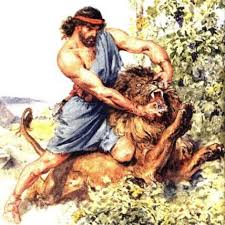 Samson
Samson... is the third-to-last of the
Judges of the ancient Israelites mentioned in the
Tanakh (the Hebrew Bible) and his story is related in the Book of Judges chapters 13 to 16. Samson was granted supernatural strength by God in order to combat his enemies and perform heroic feats such as wrestling a lion, slaying an entire army with only the jawbone of a donkey, and destroying a pagan temple. It was part of God's plan for Samson to fall in love with a Philistine woman [the
Philistines were enemies to the Israelites]. At the wedding-feast, Samson proposes that he tell a riddle to his thirty groomsmen (all Philistines); if they can solve it, he will give them thirty pieces of fine linen and garments.
The riddle, "
Out of the eater, something to eat; out of the strong, something sweet", is a veiled account of his second encounter with the lion he had killed with his bare hands (at which only he was present). The Philistines are infuriated by the riddle. The thirty groomsmen tell Samson's new wife that they will burn her and her father's household if she does not discover the answer to the riddle and tell it to them. At the urgent and tearful imploring of his bride, Samson tells her the solution, and she tells it to the thirty groomsmen... "
What is sweeter than honey? And what is stronger than a lion?" Samson killed the whole lot after he found out they had pressured his wife for the answer and then murdered her. He later met and fell in love with a woman named
Delilah [another Philistine] who also betrayed him and caused his death at the pagan temple. However, with the help of God, Samson was able to destroy the pagan temple before he died.
"Samson led Israel for twenty years in the days of the Philistines." Judges 16:20
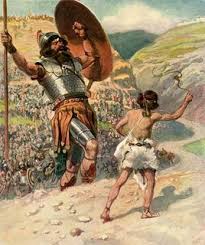 King David
King David... the account of the battle between David and Goliath is written about in 1 Samuel, chapter 17.
Saul and the Israelites were contemplating a war with the Philistines at the
Valley of Elah. Twice a day for 40 days, Goliath, the champion of the Philistines, comes out between the lines and challenges the Israelites to send out a champion of their own to decide the outcome in single combat, but Saul and all the Israelites were afraid.
David, bringing food for his elder brothers, hears that Saul has promised to reward any man who defeats Goliath, and accepts the challenge. Saul reluctantly agrees and offers his armor, which David declines, taking only his sling and five stones from a brook. David and Goliath confront each other; Goliath with his armor and shield, David with his staff and sling. Goliath the Philistine cursed David by his gods, but David replies: "
This day the LORD will deliver you into my hand, and I will strike you down; and I will give the dead bodies of the host of the Philistines this day to the birds of the air and to the wild beasts of the earth; that all the earth may know that there is a God in Israel, and that all this assembly may know that God saves not with sword and spear; for the battle is God’s, and he will give you into our hand." David hurls a stone from his sling with all his might and hits Goliath in the center of his forehead, Goliath falls on his face to the ground, and David cuts off his head. The Philistines flee and are pursued by the Israelites "as far as
Gath and the gates of
Ekron". David puts the armor of Goliath in his own tent and takes the head to Jerusalem, and Saul sends
Abner to bring the boy [David] to him. The king asks whose son he is, and David answers, "I am the son of your servant
Jesse the
Bethlehemite." The purpose of the original story was to show David's identity as the true king of Israel.
"So David triumphed over the Philistine with a sling and a stone; without a sword in his hand he struck down the Philistine and killed him." (I Samuel 17:50)
 The Maccabees
The Maccabees...
in the biblical narrative of
I Maccabees, after
Antiochus (ruler of the Seleucid Empire from 175 BC until his death in 164 BC.) issued his decrees forbidding Jewish religious practice in the nation, a rural Jewish priest from Modiin,
Mattathias [the Hasmonean], sparked the revolt against the ancient
Seleucid Empire by refusing to worship their
Greek gods. Mattathias killed a
Hellenistic Jew who stepped forward to offer a sacrifice to an idol in Mattathias' place. He and his five sons fled to the wilderness of Judah. After Mattathias' death about one year later in 166 BC, his son,
Judas Maccabee, led an army of Jewish dissidents to victory over the
Seleucid dynasty in guerrilla warfare, which at first was directed against Hellenizing Jews, of whom there were many. The Maccabees destroyed pagan altars in the villages, circumcised boys and forced Jews into outlawry. The term Maccabees was used to describe the Jewish army and taken from the Hebrew word for "hammer". The revolt itself involved many battles, in which the Maccabean forces gained notoriety among the Seleucid army for their use of guerrilla tactics. After the victory, the Maccabees entered Jerusalem in triumph and ritually cleansed the Temple, reestablishing traditional Jewish worship there and installing
Jonathan Maccabee as high priest. A large Seleucid army was sent to quash the revolt, but returned to Syria on the death of Antiochus IV. Its commander Lysias, preoccupied with internal Seleucid affairs, agreed to a political compromise that restored religious freedom. The Jewish festival of
Hanukkah celebrates the re-dedication of the Temple following Judah Maccabee's victory over the Seleucids. According to
Rabbinic tradition, the victorious Maccabees could only find a small jug of oil that had remained uncontaminated by virtue of a seal, and although it only contained enough oil to sustain the
Menorah for one day, it miraculously lasted for eight days, by which time further oil could be procured.
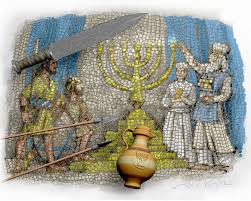
Mattathias calls upon people loyal to the traditions of Israel to oppose the invaders and the Jewish Hellenizers, and his three sons begin a military campaign against them. There is one complete loss of a thousand Jews (men, women and children) to Antiochus when the Jewish defenders refuse to fight on the Sabbath. The other Jews then reason that, when attacked, they must fight even on the holy day. In 165 BC the Temple is freed and reconsecrated, so that ritual sacrifices may begin again. The festival of Hanukkah is instituted by Judas Maccabeus and his brothers to celebrate this event (1 Macc. iv. 59).
~ * ~ * ~ * ~ * ~ * ~ * ~
"No
king is saved by the size of his army; no warrior escapes by his great strength." (Psalm 33:16)
13 Then Isaiah said, “Hear now, you house of David! Is it not enough to try the patience of humans? Will you try the patience of my God also? 14 Therefore the Lord himself will give you a sign: The virgin will conceive and give birth to a son, and will call him Immanuel."
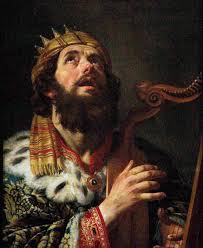
12 Now King David was told, “The Lord has blessed the household of Obed-Edom and everything he has, because of the ark of God.” So David went to bring up the ark of God from the house of Obed-Edom to the City of David with rejoicing. 13 When those who were carrying the ark of the Lord had taken six steps, he sacrificed a bull and a fattened calf. 14 Wearing a linen ephod, David was dancing before the Lord with all his might, 15 while he and all Israel were bringing up the ark of the Lord with shouts and the sound of trumpets.


